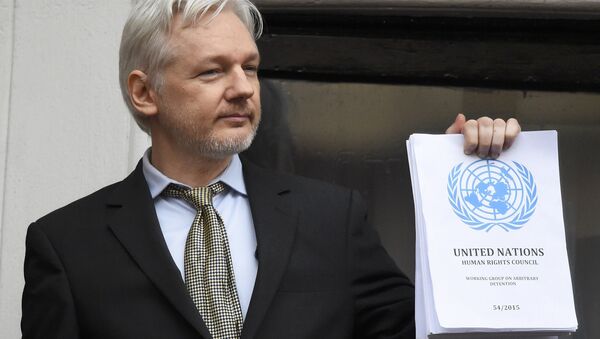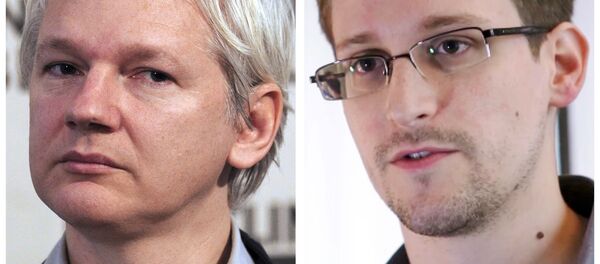The computer hacker and WikiLeaks' founder appeared this afternoon on the balcony of Ecuador's embassy in London, waving a copy of the UN panel's decision.
"How sweet it is. This is a victory that cannot be denied. It is a victory of historical importance for me, my family, my children and for the independence of the UN system."
Assange, who as the editor of whistleblowing website Wikileaks released thousands of US diplomatic cables in 2010, has been living in the embassy since June 2012 to avoid being extradited to Sweden for questioning over sexual assault claims.
#Wikileaks founder Julian #Assange addressing the crowd and press outside the Ecuadorian embassy pic.twitter.com/pgv5lGzozq
— Sputnik UK (@SputnikNewsUK) February 5, 2016
He has always denied the rape accusations, claiming the case is a dirty trick hatched to extradite him to the US, where he could be charged for the leak.
"The adequate remedy would be to ensure the right of free movement of Mr #Assange" #Wikileaks pic.twitter.com/cpIysqmUyX
— Sputnik UK (@SputnikNewsUK) February 5, 2016
In 2014 Assange appealed the UN's Working group on Arbitrary Detention, who decided in his favor this morning. Before the ruling was made public, Assange had announced he would willingly face arrest in case of a verdict against him.
Journalists and #Assange supporters outside the balcony of Ecuadorian embassy in London on Friday @wikileaks pic.twitter.com/PQOXYYa9ED
— Sputnik UK (@SputnikNewsUK) February 5, 2016
Assange, in his balcony address, underlined how the decision was taken under "humanitarian law binding covenants" the UK, Sweden and the US had agreed to comply with.
The UN’s favorable decision, while good news for Assange, does not necessarily mean that he will be able to walk out of his safe haven anytime soon.
Both Sweden and Britain, in fact, question that Assange's freedom is being limited, countering that he voluntarily entered the embassy to evade a lawful international arrest warrant.
British Foreign Secretary Philip Hammond called the non-binding UN ruling "ridiculous". The country's current position is that nothing has really changed, and Assange will be arrested if he steps out of the embassy.
Did Hammond even read the @UN's decision on #Assange? https://t.co/pLhhUYsUvA @wikileaks pic.twitter.com/pJztYwiiDV
— Sputnik (@SputnikInt) February 5, 2016
British police vans have stationed outside of the embassy throughout the day.
Police arrives next to the Ecuadorian embassy in London, where #Wikileaks founder #JulianAssange takes refuge pic.twitter.com/wWKgiWS7W9
— Sputnik UK (@SputnikNewsUK) February 5, 2016
"It’d be ill-advised [for Assange] to leave before we know what the British government and the Swedish government are eventually going to do. He will certainly and intelligently stay inside, because it’s too dangerous to come out," Gavin Macfadyen, director of the Centre for Investigative Journalism, told Sputnik.
"I have been in touch with Julian Assange today, and he’s very pleased with this result, which helps his case."
As a personal friend and supporter of the Wikileaks’ founder, Macfayden was taking part in a vigil out of the embassy together with tens of other demonstrators.
MacFadyen: next step is looking at whether the uk decides to comply with today's ruling #assange
— Gian Volpicelli (@Gmvolpi) February 5, 2016
Pro-civil right activist Jim Curran, who has been picketing the embassy twice a week since Assange took refuge there in 2012, said that he was supporting Julian Assange on pacifist grounds.
Activist Jim Curran has held vigil for #Assange for 3 yrs & doesn't think the #Wikileaks founder will come out today pic.twitter.com/yWLSKmeEow
— Sputnik UK (@SputnikNewsUK) February 5, 2016
"Julian Assange, Bradley Manning and Edward Snowden exposed international state terrorism, in particular the state terrorism of the United States and of the UK in relation to the illegal war in Iraq,” the 67-year-old Irish pensioner told Sputnik.
Criticism of the US was the general undertone of the pro-Assange vigil. Demonstrators also waved placards calling for the immediate release of Assange, with banners reading “Free Assange", "Viva Wikileaks" and "Sweden, stand up to the US".
Demonstration in support of #assange in front of the embassy. The activist also thanked Ecuador's Correa pic.twitter.com/b36meAlFAr
— Gian Volpicelli (@Gmvolpi) February 5, 2016
Some demonstrators also praised Ecuadorian president Rafael Correa for granting asylum to Assange, an Australian citizen.
Before delivering his balcony speech, Assange had commented on the verdict talking via video link to a press crowd assembled in the Frontline Club-a journalists' club in Paddington where the transparency activist lived before decamping to the embassy.
LIVE: There is no way to appeal the @UNHumanRights panel decision — #Assange https://t.co/zZk48THggC @wikileaks pic.twitter.com/0TQhaLTayb
— Sputnik UK (@SputnikNewsUK) February 5, 2016
In that press conference, Assange said that failing to abide by the UN decision would "[write] a pass for every dictator to reject UN rulings".



